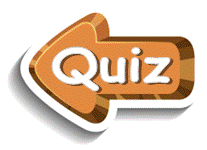
The Unleaded Web
Hello! NO PEEKING !
Did you finish the quiz?

Below are the answers to each question and a bit of the grammar reasoning to support the answer.
HI, guys. Before we visit our answers, question by question, let us take a look at the general rules behind the American English grammar that we are reviewing today.
A) NOUN - A NOUN is a word that refers to a person, animal, place, thing, or even a specific idea.
B) VERB: PAST SIMPLE TENSE - Specific times in the past.
Past Simple would be sentences with phrases such as yesterday, five minutes ago, the other day, last month, years ago, etc. Examples: I went to the pool yesterday. I studied my math homework last weekend. I ate cheesecake last month
C) VERB: PRESENT PERFECT TENSE - Vague or unknown days or time. Present Perfect tense would most likely work with sentences using the words ever/never, not yet, already, so far, to date, up till now, up to today.
Examples: "I've" never gone to see that movie before. "I have" never gone to see that movie before. I "haven't" been to that pizza restaurant, yet. I "have not" been to that pizza restaurant, yet. I haven't counted the lady bugs in the garden recently.
![]()
(What is etc. short for? I use it a lot of this Answers page. “Etc.” is an abbreviation for the Latin phrase “et cetera.” In Latin, “et” means “and.” The word “cetera” means “the rest.” It's pronounced, “et SET uh ruh.” So it means, "what I wrote before, and more that I don't have room for here."
![]()
OK, let us review each of the questions and answers we explored on the previous page. (explored = looked at) (previous page = The page you looked at before this page.)
Q1 (Question 1)
My friend and I ____ our homework every day.
does
doing
do
The correct answer is "do". In this sentence, "My friend and I" is the subject. There are two people. So our subject (friend and I) and the word "our" are plural. (Plural = more than one.) We use the verb "do" to agree with our subject.
Examples:
Currently we are "doing" our homework.
Last week we "did" our homework.
Tomorrow we "will do" our homework.
He "does" his homework. (singular present)
He "did" his homework yesterday. (Singular past)
![]()
Q2 (Question 2)
We have plenty of time, ___ we?.don't
haven't
doesn't
According to American grammar rules, because "we have plenty of time" is in the present simple tense, the correct tag would be "don't": "We have plenty of time, don't we?"
What is the ' in the word "don't". When you see a ' in a word, it is a "contraction". (contraction = to make smaller. The ' means one or more letters are not written.) The word "Don't" means "Do not". The ' replaces the letter O, and moves the letters together to make one word. (Do Not = Don't.) This is the tag that's typically used in American English.
![]()
Q3 (Question 3)
... are ten students in my class..There
Their
Them
The correct answer is "there". In this sentence, "there" is used as an adverb to indicate the existence or presence of something. It is the appropriate word to describe the number of students in the class.
THEIR is not correct. "Their" refers to something that belongs to or is connected to someone (They or them = people in a group): It was their money, and they could spend it as they liked. "Their" is also used to refer to a single person, if the speaker does not know if the other person is a boy or girl.
Example: Someone forgot to take their umbrella.
While "their", "there", and "they're" may sound alike when spoken, the words have different meanings. "They're" refers to multiple people that are doing something. "They're" all doing their homework. "They're" is a contraction. Remember? A shortened word. "They're" is "They are".

Q4
Mr. Smith is my school teacher.teach
teaches
taught
The correct answer is "teaches" because it is
the present tense form of the verb "teach" and agrees with the subject "Mr.
Smith." Mr. Smith is the teacher today (present). The phrase "my grade
school" provides additional information about where Mr. Smith teaches.

Q5
How ____ does this book cost?many
much
price
This question is asking about the cost, price, of the book. The word "much" is used to inquire about the amount or extent of something; in this case, the cost of the book. Therefore, "much" is the appropriate word to use in this context.

Q6
Here is a question for you to answer: What is the plural form of 'knife".knifes
nifes
knives
The correct answer is "knives" because when forming the plural of the word "knife," the letter "f" changes to "v" and the plural suffix " es " is added. This is a common rule in English grammar for nouns ending in "f" or "fe."
Examples:
wife - wives
wolf - wolves
life - lives
scarf - scarves*
American English language changes with each generation. The plural of scarf is a word that seems to be changing today. Originally the plural of a scarf was scarfs. Then, came the years where more than one scarf became scarves. In 2023, I find the Oxford dictionary still holds scarves as the plural; however, other sources are changing back to scarfs. A recent review shows the word scarfs has become the more popular choice today. Grammatically, both scarfs and scarves are correct. My mom wore a scarf. My mom and Lulu wore scarves (or scarfs).

Q7
My grandmother ___ with us this week.stays
staying
is staying
The correct answer: "is staying."
This is because the sentence is referring to a temporary action that is
happening in the present. The verb "is staying" is in the present
continuous tense, which is used to describe actions that are happening at
the moment of speaking. Therefore, "is staying" is the most appropriate
choice to indicate that the aunt is currently living with us this week.

Q8
I ____ a bike on the last weekendride
ridden
rode
The correct answer is "rode" because it is the
past tense form of the verb "ride". In this sentence, the speaker is
referring to an action that happened in the past, specifically on the last
weekend. Therefore, "rode" is the appropriate verb form to use in this
context.

Q9
What time ... home from school?have you got
you got
did you get
The correct answer is "did you get." This is because the question is asking about a past event, specifically when the person arrived home from school. The use of "did" as an auxiliary verb is necessary to form the past tense of the verb "get."

Q10
I -------- it now.want
wants
wanting
Transitive verb - want - To have a desire or a wish for something. Want is an action verb. What do you want, or wish for? One has to explain what they want in the sentence. I want it now. I want ice cream.
To make sense, the verb needs to point to something. In grammar-speak: transitive verbs ‘take’ a direct object.
Example: The director wants his lunch. The sentence would not make sense if it read, "The director wants." Wants what? Lunch. The director wants lunch.
The action: (wants) passes from the subject (the director) to the direct object (his lunch). In this sentence, ‘wants’ is a transitive verb.
BUT WAIT - THERE IS MORE ! Of course there is.
Intransitive verbs
Intransitive verbs don’t need an object to make sense – they have meaning on their own.
Intransitive verbs don’t take a direct object. Instead, intransitive verbs might have an adverb or adverbial phrase that completes their meaning.
Example:
The chaplain reads.
In the above sentence, ‘reads’ is an intransitive verb, but many verbs can be both transitive and intransitive. It really depends on the sentence. For example, the verb ‘reads’ is intransitive in my example above, but "reads" can also be transitive.
The chaplain reads quickly.
quickly = adverb
The chaplain reads in the garden. "in the garden" in our sentence is an
Adverbial Phrase. Phrase = more than one word
The action (reads) does not pass from the subject (the chaplain) to anything. Instead, the adverb (quickly) and Adverbial phrase (in the garden) complement the verb (reads).
The chaplain reads the lesson. The verb ‘reads’ is transitive in this sentence because it passes the work over to "the lesson".
Pssst. Just for you smarty pants: Yes, 'in the garden", an adverbial phrase, starts with the preposition word ‘in’, so is usually known as a ‘prepositional phrase’. However, we are just working with verbs and adverb definitions at the moment.

Q11
Here is a grammar question for you. What Is The Past Tense Of Go?goes
gone
went
The past tense for go is “went”. Wow. That is a whole new word.
The verb “go” is an irregular verb. So, the “go” past tense doesn’t have just a few letters added to its spelling. The spelling totally changes.
“Go”, “goes”, “going”, “went”, or “gone” are verbs, words that describe an action in the sentence. “Go” is the main verb, while the others are its tenses of past, present, future. According to the Cambridge Dictionary, the verb “go” means to travel. It's ( Contraction? It's = It is) used to describe the act of moving from one place to another.

Q12
You look so tired. What ___ all day?have you done
did you do
have you been doing
This is a tricky sentence.
This question is asking about the person's recent activities. The correct answer "have you been doing" is in the present perfect continuous tense, which is used to talk about an action that started in the past and is still happening.
It implies that the person has been doing something that has made them tired. And they are still tired. The other options ("have you done," "did you do,") do not put into words the that person is still tired, so they are not correct for this sentence.

Q13
She ____ hard.try
trys
tries
This is more of a spelling check. A plural form of try is correct, because she tries more than once. TRIES is present tense. The dictionary shows the word TRY means " to make an effort to do something " and " to attempt to accomplish or complete something ". The plural of TRY is TRIES. Remove the Y and add IES. If she did this yesterday it would be TRIED.

Q14
____ went to see a movie today.Betty, Wilma, and me
Betty, Wilma, and I
Me, Betty and Wilma
We visit two schools with this answer: Polite and Grammar.
Ms. Manners says it is not polite or proper for a person to put their own name first in a list of names.
American English grammar tends to agree. Most of the time. A proper sentence is something like, "John and I went to the beach. If you are going to the beach with several people, then the correct grammar would be, " John, Sarah, Kevin and I went to the beach".
You are free to choose
any order you like, so long as 'and I' comes last.
The Britannica Dictionary states it this way:
Use "I" when it is the subject of the sentence and use "me" when it is the object of the sentence.
The correct statement is "Happy Birthday from Bob and me." The phrase "Bob and me" is the object of the preposition "from" so you should use the object pronoun "me."
As I mentioned above, sometimes you can tell which personal pronoun is correct by removing the other person, in this case, Bob.
Happy Birthday from I
Happy Birthday from me
Here are more examples showing when to use "me":
He gave the tickets to Bob and me.
They said they would wait for Bob and me.
The confetti rained down over Bob and me.
Our boss flew Bob and me to Seattle for work.
Our friends threw Bob and me a going away party.
Here are some examples showing when to use "I":
Bob and I arrived early to the dinner party.
Bob and I will be out of town next week.
Bob and I gave the kids several gifts.
In one month Bob and I will be moving.

Q15
Teresa: What does Alena normally do in her free time?
Teresa: What does Alena normally do in her free time?She reads books in her free time
She usually reads books in her free time
she read a book in her free time
When we added the word normally to the sentence, we understood this was a general question without an absolute answer. No one can do the same thing all the time. So we understand that Alena usually reads when she has free time, but it isn't the only thing she does.

Wow! My head hurts. This is a lot of thinking.
I hope this helped. You can re-visit this page anytime and just review one item at a time, if you wish.
![]() to return to
top of THIS page.
to return to
top of THIS page.